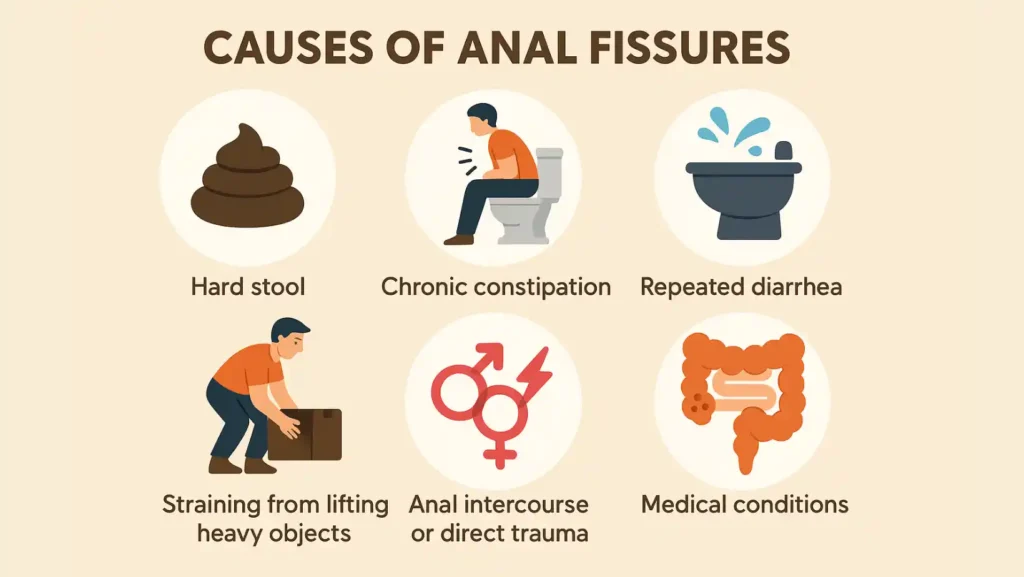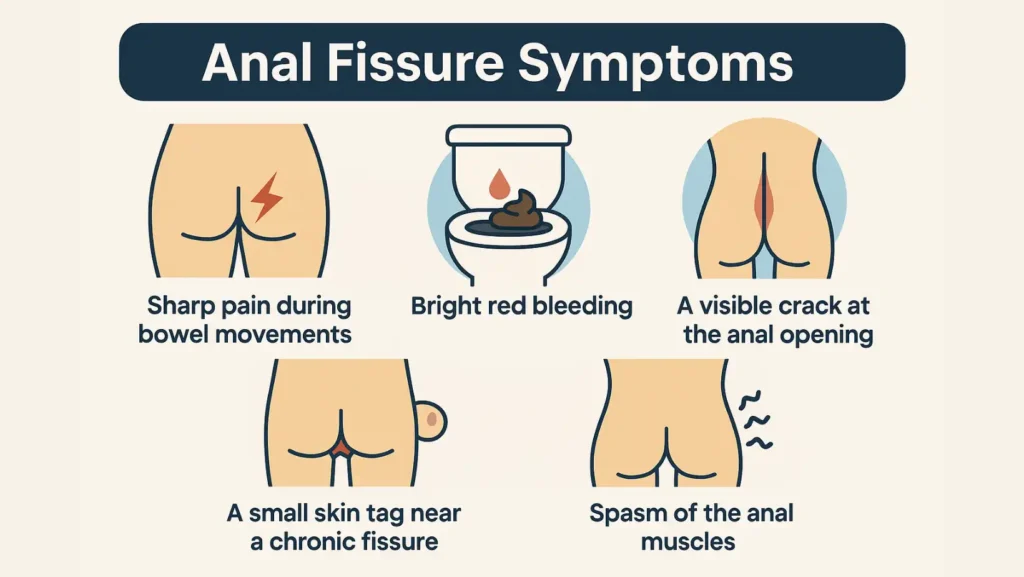Anal fissures are among the most painful yet often overlooked problems in digestive health. A small tear in the anal lining can lead to intense pain, bleeding, and a constant fear of using the bathroom. Many people confuse fissures with piles, yet they are not the same.
Table of Contents
ToggleThis detailed guide will explain what an anal fissure is, what triggers it, how to recognize anal fissure symptoms, the best anal fissure treatment options, and effective anal fissures prevention strategies.
Let’s break everything down in detail.
What Is An Anal Fissure?
How Does A Tear In The Anal Lining Occur?
The anus is lined with delicate skin. When stool passes, especially if it is hard or bulky, it can cause a small cut. This cut exposes nerve endings and the internal anal muscle. The exposed nerves trigger sharp pain and spasm of the anal sphincter. The spasm reduces blood flow, making healing slower. This cycle often explains why fissures do not heal quickly.
What Are Anal Fissures And Why Do They Happen?
Anal fissures are simple but painful tears that form when the anal tissue stretches beyond its natural limit. In most cases, the cause is constipation and hard stool, but they can also appear after diarrhea, childbirth, or conditions like inflammatory bowel disease. Unlike piles, which are swollen veins, fissures are direct tears of the lining.
What Are The Symptoms Of Anal Fissures?
How Do I Know If I Have An Anal Fissure?
The hallmark sign is pain that feels like cutting or burning during a bowel movement. Unlike hemorrhoids, the pain from fissures lingers for minutes or even hours afterward. Small spots of bright red blood often appear on toilet paper or in the toilet bowl.
Common Anal Fissure Symptoms To Watch For
- Sharp pain during bowel movements that continues afterward
- Bright red bleeding separate from stool
- A visible crack at the anal opening
- A small skin tag near a chronic fissure
- Spasm of the anal muscles, making passing stool harder
These anal fissure symptoms often mimic piles, but the intensity of pain is usually much higher in fissures.
What Are The Causes And Triggers Of Anal Fissures?
What Causes Anal Fissures Most Often?

The single most common trigger is constipation. Straining and passing hard stool stretches and tears the anal lining. Diarrhea, paradoxically, can also cause fissures because repeated wiping and irritation weaken the skin. Childbirth is another frequent reason, as the pressure during delivery can split the anal lining.
So, causes of anal fissures are
- Hard stool
- Chronic constipation
- Repeated diarrhea
- Straining from lifting heavy objects
- Anal intercourse or direct trauma
- Medical conditions like Crohn’s disease and anal fissure connection
Lifestyle And Diet Factors Behind Anal Fissures
A low-fiber diet creates dry, hard stool that tears the lining. Low water intake worsens this. Ignoring the urge to pass stool makes it drier and bulkier. Poor toilet posture, like sitting for long periods on the commode, also increases strain. People with sedentary jobs are especially prone.
A common overlap occurs between constipation and anal fissure. The longer constipation lasts, the deeper the fissure may become. This explains why chronic fissures develop in untreated cases.
Table: Diet & Lifestyle Triggers of Fissures
| Trigger | Effect on Anal Lining |
| Low fiber diet | Hard stool formation |
| Dehydration | Dry stool, difficult passage |
| Ignoring urge | Stool becomes larger and firmer |
| Prolonged sitting | Increases pressure on anus |
| Straining at gym | Sudden rise in anal pressure |
What Should You Know About Anal Fissure Diagnosis?
How Do Doctors Diagnose An Anal Fissure?
Doctors usually confirm it by visual inspection. A bright light is used to check the anal opening. A fissure appears as a thin cut, usually at the back or front of the anus. If needed, anoscopy or sigmoidoscopy may rule out other rectal bleeding causes like polyps, hemorrhoids, or cancer.
Is Self-Diagnosis Reliable Or Risky?
Self-diagnosis is risky because many conditions mimic fissures. For instance, hemorrhoids, infections, and even anal cancer can look similar. Relying on online pictures is unsafe. Always see a doctor if symptoms last beyond two weeks.
Treatment Options For Anal Fissures
Anal Fissure Treatment At Home
The first line of anal fissure treatment includes:
- High-fiber diet with vegetables, fruits, and grains
- Adequate hydration (2–3 liters of water daily)
- Warm sitz baths twice a day to relax sphincter muscles
- Stool softeners for fissures like lactulose or docusate sodium
- Avoiding straining during bowel movements
These home-based measures help most people within two to three weeks.
Anal Fissure Cure: What Really Works
When conservative care fails, medications help:
- Nitroglycerin ointment for fissures: Relaxes the sphincter muscle and improves blood flow
- Calcium channel blockers like diltiazem cream
- Botox injection for anal fissure: Temporarily paralyzes the sphincter, breaking the pain-spasm cycle
These steps act as a reliable anal fissure cure in cases where home remedies do not work.
How To Know If Your Fissure Is Healing?
Signs of healing include:
- Reduced pain during bowel movements
- Decreased bleeding
- Less muscle spasm
- A closing tear on examination
If after 6 weeks pain persists, it may be a chronic fissure that requires further treatment.
Anal Fissures Surgery: When Is It Needed?
Persistent fissures may require anal fissures surgery. The gold standard is lateral internal sphincterotomy. In this procedure, the surgeon makes a tiny cut in the anal sphincter muscle to reduce spasm and improve blood flow. This surgery cures more than 90 percent of chronic fissures. Other surgical approaches include fissurectomy, though less common.
Prevention And Long-Term Care
How To Prevent Anal Fissures Through Diet And Lifestyle?
To prevent anal fissures, you need to develop bowel-friendly habits:
- Daily fiber intake of 25–35 grams
- At least 2 liters of water daily
- Regular toilet habits, without delaying the urge
- Proper toilet posture: using a footstool to squat while sitting can ease strain
- Avoiding excessive caffeine and alcohol, as they dehydrate stool
Long-term anal fissures prevention depends on keeping stool soft and bowel habits regular.
Can Stress Or Anxiety Contribute To Anal Fissures?
Yes. Stress alters bowel movement patterns. Some develop constipation while others get diarrhea. Both increase fissure risk. Anxiety also makes sphincter muscles tighter, worsening pain during defecation. Stress management indirectly helps fissure recovery.
How Long Does It Take To Heal From An Anal Fissure?
An acute fissure heals in 2 to 6 weeks with proper care. Chronic fissures can take several months and may not heal without medical intervention. Surgery shortens the healing period significantly.
Book Your Consultation With Dr. Nivedita Pandey Today
If you are struggling with persistent anal pain, bleeding, or recurring fissures, do not delay. Dr. Nivedita Pandey, a gastroenterologist, offers advanced care. From topical medications to botox injection for anal fissure and surgical options like lateral internal sphincterotomy, she tailors treatment to your needs. Early treatment ensures faster recovery and prevents chronic complications.
FAQs
How to heal an anal fissure?
A fissure heals by softening stool, using warm baths, prescribed ointments, and avoiding strain. If chronic, medical or surgical options may be required for full healing.
Is anal fissure serious?
Most fissures are not life-threatening but ignoring them leads to chronic pain, scarring, and sometimes surgery. Early treatment ensures fast recovery and prevents complications.
What happens if you ignore a fissure?
Ignoring a fissure prolongs pain and may create a chronic tear with scar tissue. It can cause persistent bleeding, severe spasm, and lead to surgical intervention.
How do you treat anal fissures?
Treatment includes diet changes, stool softeners, sitz baths, topical ointments, Botox, or surgery. Choice depends on whether the fissure is acute or chronic in nature.
What causes anal fissures?
The commonest cause is constipation with hard stool. Other causes include repeated diarrhea, trauma, childbirth, and diseases like Crohn’s that weaken the anal lining.
Are fissures and piles the same?
No. Fissures are tears in the anal lining, while piles are swollen veins. Both may bleed, but fissures cause sharp pain, unlike piles which cause dull ache.
What is the final stage of a fissure?
A chronic fissure develops scar tissue, skin tags, and fails to heal naturally. It often requires Botox or surgical treatment like sphincterotomy for complete cure.
About The Author

Medically reviewed by Dr. Nivedita Pandey, MD, DM (Gastroenterology)
Dr. Nivedita Pandey is a U.S.-trained gastroenterologist and hepatologist with extensive experience in diagnosing and treating liver diseases and gastrointestinal disorders. She specializes in liver enzyme abnormalities, fatty liver disease, hepatitis, cirrhosis, and digestive health.
All content is reviewed for medical accuracy and aligned with current clinical guidelines.






